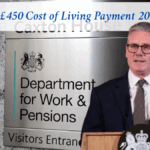The UK Department for Work and Pensions (DWP) has announced a major financial uplift for millions of citizens. The package includes increases in the State Pension, enhanced Universal Credit payments, and a special one-off £750 payment for disabled individuals. These changes are part of the government’s broader effort to support vulnerable groups and working families through the rising cost of living and inflationary pressures.

DWP Announces Major Income Boost for Pensioners
| Measure | Details | Effective Date | Official Link |
|---|---|---|---|
| State Pension Increase | Basic State Pension rises from £169.50 to £176.45 per week; New State Pension increases from £221.20 to £230.25 per week | 7 April 2025 | gov.uk |
| Universal Credit Adjustment | Standard allowance increases by 1.7%; average annual boost of £150 for 5.7 million households | 7 April 2025 | gov.uk |
| Pension Credit Minimum Guarantee | Increases by 4.1%; single pensioners receive £227.10 per week, couples receive £346.60 per week | 7 April 2025 | gov.uk |
| £750 One-Off Payment | Tax-free payment for recipients of PIP, DLA, Attendance Allowance, and similar benefits; no application required | 20–30 June 2025 | regulatorydatabase.in |
State Pension Enhancements
Starting from 7 April 2025, the DWP will increase the state pension by 4.1%. This follows the government’s Triple Lock commitment, which ensures pensions rise by the highest of inflation, earnings growth, or 2.5%. The rise equates to:
-
Basic State Pension increasing from £169.50 to £176.45 per week
-
Full New State Pension rising from £221.20 to £230.25 per week
This boost means pensioners will see an annual increase of between £360 and £470, depending on their eligibility and which pension scheme they are under. This change is aimed at shielding retirees from inflation and ensuring long-term financial stability.
Universal Credit Adjustments
Universal Credit recipients will see a modest but meaningful increase in their monthly payments. The standard allowance will increase by 1.7%, resulting in an average annual gain of about £150 per household. Over 5.7 million households across the UK are set to benefit from this update. The change targets low-income working families and those affected by temporary unemployment.
The new rates apply automatically from 7 April 2025 and do not require any action from claimants. The uplift is part of ongoing annual adjustments based on the Consumer Price Index.
Pension Credit Minimum Guarantee Boost
Pension Credit, which provides income support to pensioners with low income, will also be enhanced. The Guarantee Credit element will rise by 4.1%. This means:
-
Single pensioners will receive at least £227.10 per week
-
Pensioner couples will receive at least £346.60 per week
These changes ensure pensioners on the lowest incomes are not left behind, especially those not eligible for the full State Pension or relying on top-ups due to limited savings or employment history.
£750 One-Off Disability Payment
A major highlight of the announcement is a one-time, tax-free payment of £750 for disabled individuals. This includes recipients of:
-
Personal Independence Payment (PIP)
-
Disability Living Allowance (DLA)
-
Attendance Allowance
-
Armed Forces Independence Payment
The payment will be made automatically between 20 and 30 June 2025. No application is needed, and eligibility is determined by existing benefit status as of May 2025. This initiative is aimed at helping disabled citizens meet additional living costs and providing relief amidst high energy and healthcare expenses.
Support for Working Households
In addition to benefit-specific changes, the government is also making minor adjustments to tax thresholds and National Insurance Contributions (NICs), intended to ease pressure on working households. While not directly part of DWP’s remit, these fiscal changes complement the income support measures and are expected to improve disposable income for millions.
Long-Term Impact and Considerations
These income increases are intended to reduce poverty rates among pensioners, support households relying on benefits, and stabilize the financial standing of disabled individuals. However, analysts have noted that while the increases are welcome, they may not fully offset the cumulative impact of inflation over the past three years.
Critics argue that a more substantial reform of Universal Credit and a higher one-off disability payment would provide stronger long-term relief. Nonetheless, the announcements represent a clear signal that the government recognizes the mounting financial pressure on vulnerable groups.
FAQ
What is the Triple Lock and how does it affect pensions?
The Triple Lock ensures pensions increase each year by the highest of inflation, average wage growth, or 2.5%. It protects the value of pensions over time.
Do I need to apply for the £750 disability payment?
No. The payment will be made automatically to those receiving qualifying benefits during the eligibility window.
When will the increased Universal Credit payments begin?
Increased payments will be reflected starting from 7 April 2025 in regular payment cycles.
Who is eligible for the new Pension Credit rates?
Individuals over the State Pension age with low income and limited savings who qualify for Guarantee Credit will benefit from the new rates.
Is this a permanent increase in benefits?
State Pension and Universal Credit increases are part of annual adjustments, while the £750 disability payment is a one-time support measure.
Click Here To Know More



